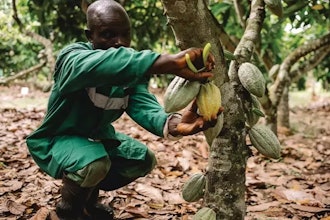MILWAUKEE (AP) — Small and organic vegetable farmers who say proposed federal food safety rules could harm their businesses have organized dozens of events nationwide to inform people about the regulations and encourage them to write to the Food and Drug Administration.
The FDA proposed the rules in response to the 2011 Food Safety Modernization Act, a major update aimed at preventing foodborne illness instead of reacting to it. Among other measures, the rules would require farmers to take precautions against contamination, including ensuring that workers' hands are washed, irrigation water is clean and animals stay out of fields.
While small farmers agree with the law's goal of creating a safer food supply, they say the rules show a lack of understanding of agricultural practices and could be costly enough to force some out of business. The National Sustainable Agriculture Coaliton, National Young Farmers Coalition and other groups have started a campaign to encourage the public to write to the FDA before the comment period ends Nov. 15.
It's unclear whether the government shutdown will affect that timeline.
"I think the main thing is that it's really important for farmers and consumers both to make comments to the FDA because these rules will have a huge effect on local farms and their ability to provide," said Lindsey Shute, spokeswoman for the National Young Farmers Coalition.
Shute and her husband have a community-supported agriculture, or CSA, farm in Clermont, N.Y., where they use manure from their chickens and a neighboring farm as fertilizer to grow a variety of vegetables. The chickens are rotated from field to field in an accepted organic method. Shute said national organic standards allow them to harvest about four months after the animals leave a field. The new rules would stretch that to nine months, which is far longer than the growing season.
Shute said she's also concerned her farm would have to test water from its irrigation ponds every week, costing an estimated $5,000 to $10,000 per year and requiring regular hour-long, one-way drives to the nearest lab.
She and her husband are planning a letter that might say, "FDA, if you require me to test my water every week, I will go out of business."
In Wisconsin, Michael Fields Agricultural Institute has organized three letter-writing sessions — Oct. 21 in Madison, Oct. 23 in Milwaukee and Nov. 4 in Middleton. Margaret Krome, the nonprofit institute's public policy director, said there's a lot of confusion about the rules.
The law includes exemptions for farmers whose sales are under a certain amount, but food activists are concerned those waivers won't always apply.
For example, a farmer who buys produce from another farmer and delivers it in a CSA box could be classified as "facility" and subject to regulations aimed at big food businesses, said Brian Snyder, executive director of the Pennsylvania Association for Sustainable Agriculture. In Pennsylvania, Wisconsin and elsewhere, it's not uncommon for CSA farmers to buy from others in times of drought or heavy rain to satisfy customers who have paid in advance for weekly deliveries.
Synder said that's why it's also important for consumers to learn about the law and write to the FDA.
"They need to know that the exemptions that they might have heard about in the law are problematic and that the way they're applied is going to matter a lot to the local food vendors they are used to going to," he said.
Krome also said the risk with small farms is less than with big vegetable growers simply because they serve fewer people.
"Everybody wants food safety," she said. "The only thing people want is that it is proportionate to the risk and that it not be designed such that it puts their businesses at risk."
___
Online:
Michael Fields Agriculture Institute: http://michaelfields.org
National Sustainable Agriculture Coaliton: http://sustainableagriculture.net
National Young Farmers Coalition: http://www.youngfarmers.org
Pennsylvania Association for Sustainable Agriculture: http://www.pasafarming.org






















